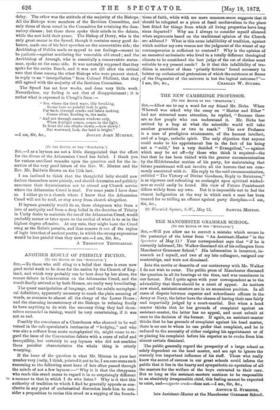ANOTHER RESULT OF PRIESTLY FICTION.
[TO THE EDITOR OF THE "SPECTATOR.")
SIR,—To those who still cling to a belief that there is even now good social work to be done for the nation by the Church of Eng- land, and which very probably can be best done by her alone, the recent debate in Convocation on the Athanasian Creed, and the result finally arrived at by both Houses, are really very humiliating.
The queer manipulation of language, and the subtle metaphysi- cal definitions, apparently necessary to reach the plain meaning of words, so common to almost all the clergy of the Lower House ; and the charming inconsistency of the Bishops in refusing finally to have anything to do with the uncanny thing they had them- selves succeeded in raising, would be very entertaining, if it was not so sad.
Possibly the conscience of a Churchman who chanced to be well versed in the safe speculator's intricacies of " hedging," and who was also a sufferer from acute metaphysical tic, might come to re- gard the issue of the Convocation debate with a sense of relief and tranquillity, but certainly to any layman who did not combine these peculiar characteristics the whole thing is utterly wearying.
If the issue of the question is what Mr. Minton in your last number very justly, I think, pointed it out to be, I am sure some such reasoning as the following must have of late often passed through the minds of not a few laymen :—" Why is it that the clergyman who reads this creed seems to regard it in so surprisingly different ale a manner to that in which I do who listen ? Why is it that this authority of tradition to which I find he generally appeals as con- clusive in any point of ecclesiastical discussion leads him to con- sider a proposition to revise this creed as a sapping of the founda- tions of faith, while with me mere common-sense suggests that it; should be relegated as a piece of fossil mediaavalism to the placer best fitted for things from which all living properties have long since departed? Why am I always to consider myself silenced when arguments based on the traditional opinion of the Church are adduced ? What is this same infallibility of tradition, against which neither my own reason nor the judgment of the wisest of my contemporaries is sufficient to contend ? Why is the opinion of an ancestral ecclesiastic who lived in a totally different theological climate to be considered the beat judge of the cut of clothes most- suitable to wy present needs? Is it that this infallibility of tra- dition is another of those ' priestly fictions' found necessary to bolster up ecclesiastical pretensions of which the existence at Rome- of the Dogmatist of the universe is but the logical outcome?"—


































 Previous page
Previous page